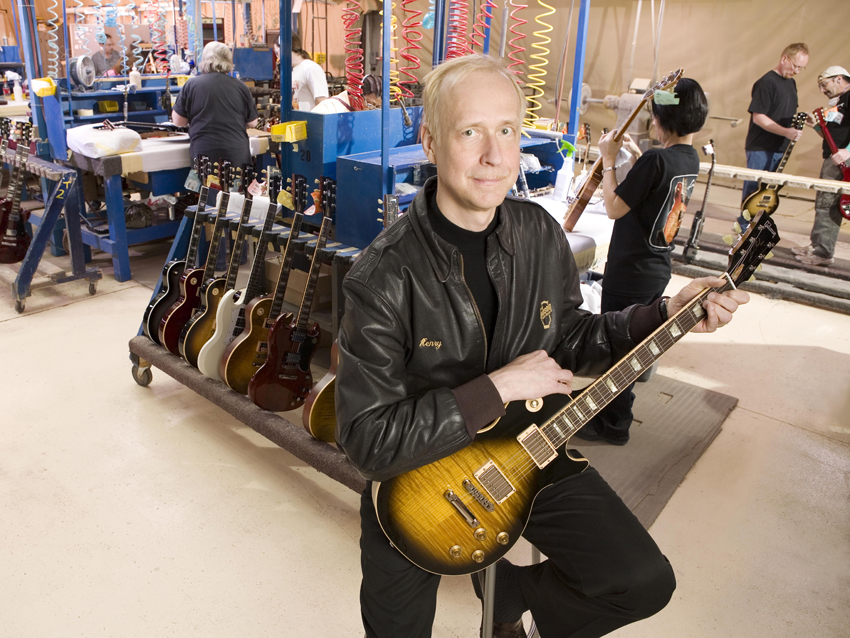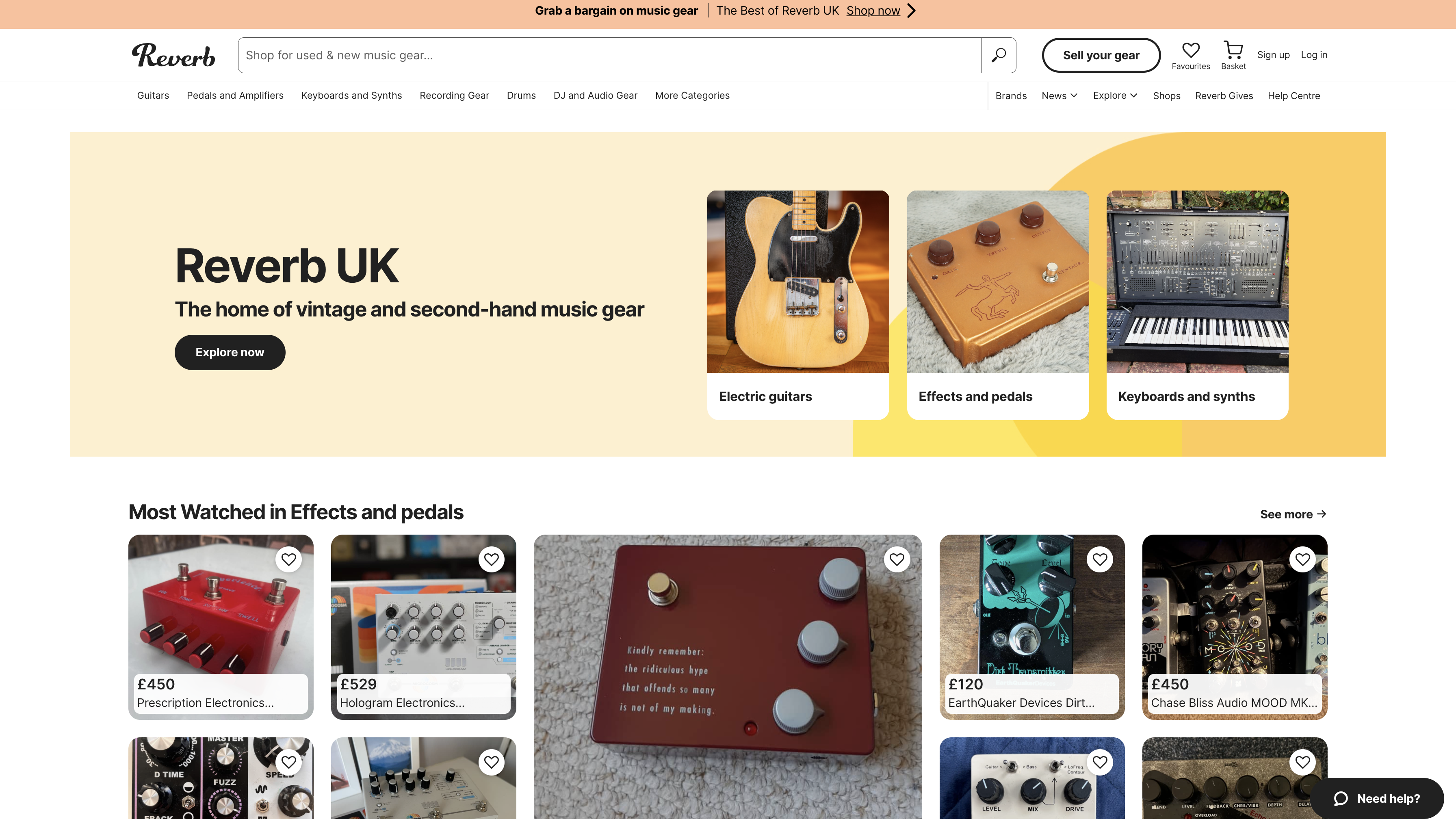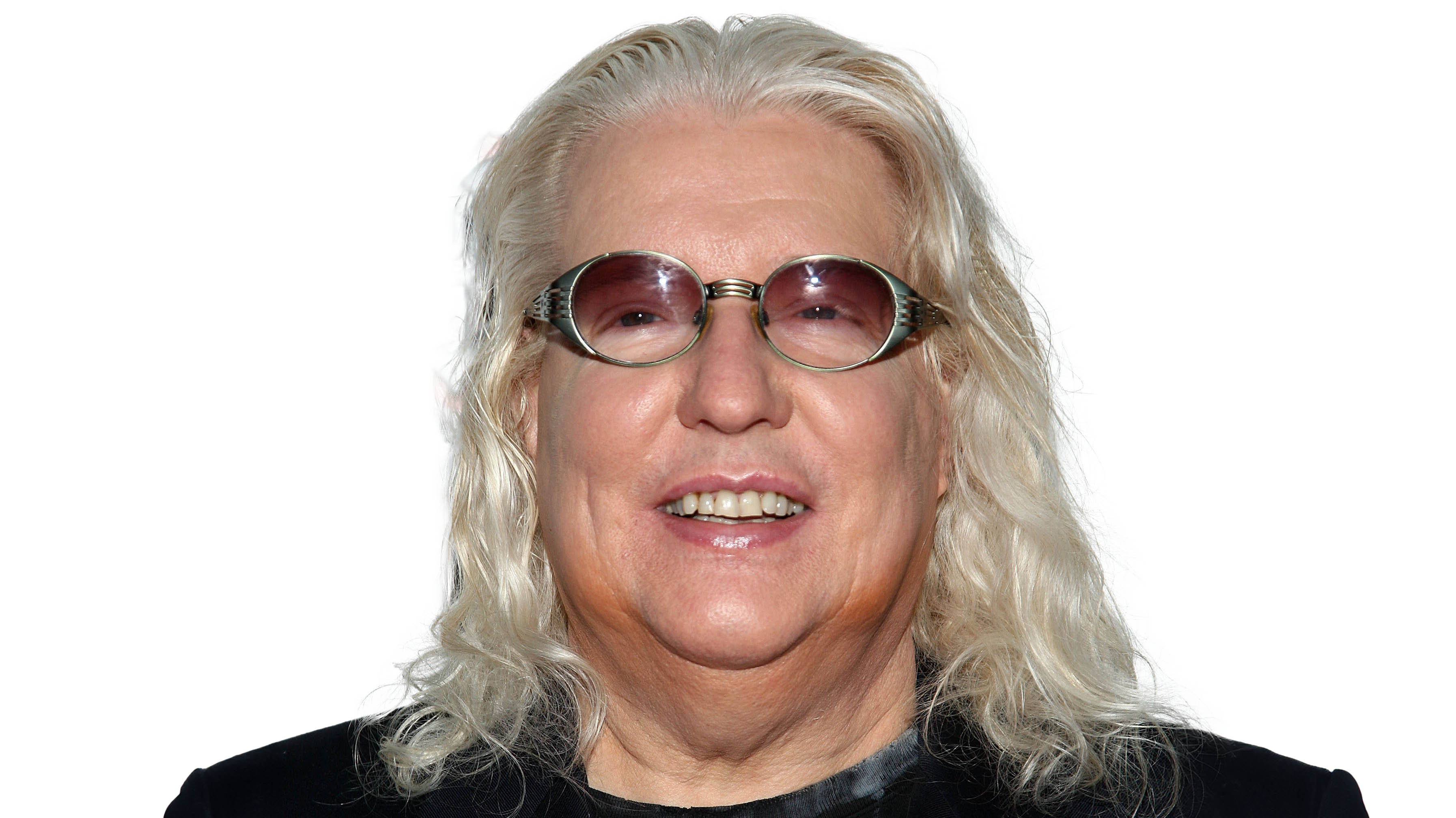Interview: Gibson Guitar Chairman and CEO Henry Juszkiewicz

Few people in the music industry are as revered and reviled in almost equal measure as Henry Juszkiewicz.
To some, Henry has steered Gibson brilliantly through one of the most traumatic decades in its history. The 2010 Nashville floods that left that historic city and the Gibson factory in near ruin and the confiscation of allegedly illegal tone-woods by the US government would test the resolve of the toughest soul.
To others, Juszkiewicz has led Gibson to a clumsy collision with technology that has resulted in the infamous Firebird X and the self-tuning Robot guitars. Now he's turned his attention to pro audio and turntables for audiophiles. Whatever side you're on, Henry Juszkiewicz's thoughts make for fascinating reading.
You recently announced the purchase of the Stanton Group, a company predominantly known for DJ decks and similar equipment. Are you hedging your bets in case the guitar plummets in popularity?
"Contrary to what you'll read in blogs, I don't think our consumer actually wants an inexpensive Gibson."
"We've been looking for something in the pro audio market for some time. We found something that was complementary; a good match for Gibson. They were an excellent fit for us. In general, we are looking for ways to expand our vision of being the music lifestyle company. Audio is a natural extension of what we're about."
Where does audio fit in with your plans to promote Gibson as a lifestyle company?
"Audio is the poor stepchild of the electronics business. When I was young it was a big deal. College kids would get these very elaborate stereo systems. Quality audio and high fidelity meant something. With the onset of the iPod, that whole area has gone to a much lower level of experience in my view.
Get the MusicRadar Newsletter
Want all the hottest music and gear news, reviews, deals, features and more, direct to your inbox? Sign up here.
"The iPod is a good experience but it's far short of the excellent experience you can get when you have really great gear. That market is under-served; to the detriment of the population. I think we can restore the lustre to the audiophile."
Is the steady growth in the popularity of vinyl a factor in your decision to invest in audio?
"I think people are ready. There are a lot of indications of that. No-one's delivering that quality; nobody is being the voice for quality in the marketplace. Well, Bose is doing that. No-one else is. We see a big hole in the marketplace we can fill."
Do you see Stanton products as a potential competitor to the iPod?
"I don't think it competes with the iPod. It supplants it."
So, can we expect to see Gibson branding on turntables in the near future?
"We would definitely introduce Gibson but the three brands that we have are quite powerful. Stanton is the originator of the cartridge needle. The history of that company, its expertise in the DJ area in particular, is wholly unique. I don't see Gibson usurping that.
"In the audio space I think, just as in the guitar field, we're going to have multiple brands that reflect multiple price points. There's a role for Gibson in that, absolutely."
Will we ever see a time when Gibson guitars are built in the Far East?
"Absolutely not. I don't think it would kill the brand - our colleagues at Fender have shown that isn't the case. It would absolutely tarnish a lot of the prestige that Gibson reflects.
"The fact is that when you compromise on anything you pay a price. There are lots of people going to the Orient, battling for price. Very few people are like Gibson, sticking to our guns, keeping production in the US."
How low do you think you can you get the price of a US-made Gibson?
"I don't think our consumer actually wants an inexpensive Gibson. Contrary to what you'll read in blogs. We've introduced some very low-cost Gibson guitars and they've done very poorly. Our higher priced product is doing well. So, the marketplace is actually telling us something quite different and it makes a lot of sense.
"Would anyone really want a Chinese-made Mercedes Benz? They might say they do but the reality is probably different. Like (Gibson founder) Orville said, 'We only want to do the very best'. Gibson is about being the very best. That's what the brand stands for. That's what the consumer wants from us, I believe."
You still need to get the kids into the brand...
"Yes, and we are very much looking at bringing affordability to the guitar. To a large extent we have. We have a lower cost brand called Maestro. We sell a lot of units. The price is $99 is some cases or less for really great quality guitars.
"When I was young you could get guitars in that price range but they weren't really playable. So, we're dedicated to bringing the best quality and best pricing all through the market. We're just dedicated to players. If they want it we'll get it."
Your facility in Nashville recovered remarkably quickly after the flood in 2010...
"That's because of the great workforce that we have. It didn't have to go that way. It could have been much worse. We have a remarkable crew of dedicated people who really gave their all... in many ways. They worked in poor conditions, and worked long hours to make things happen. It's a testament to the workforce that makes the guitars."
Did the flood change the way the factory operates?
"It's like the house you built was destroyed and you say, 'Well, it was a really nice house but this didn't work and that didn't work'. You have to fix those things and circumstances allow you to improve. And we did.
"There's a lot of new equipment and processes started up after the flood. Under normal circumstances we might not have done that. Although we were forced to do that the results have been outstanding."
You play guitar. Do you have a favourite Gibson model?
"I play the Firebird X. It's a smoking guitar! Once you get into it it's really very difficult to play anything else. You don't want to go back."
Funny you should use the term 'smoking'. A fair number of Gibson fanatics would probably love to see a Firebird X set on fire. How do you feel about the mixed reaction the guitar has received?
"I feel pretty good about it actually. We never anticipated it being a big seller. We only built a very tiny amount of guitars. So, you might say it didn't get a great reaction. Well, we're selling most of them! You'll find it very hard to find one in retail. So, much of what you hear is scuttlebutt and gossip as opposed to reality. It's a very innovative instrument.
"Clearly it's going to take people a long time to really understand it. That was our expectation. It's more or less playing out as I expected."
Why don't you make your life easy and just make Les Pauls, SGs and the guitars you're best known for rather than take a gamble on something like the Firebird X?
"A lot of markets grow very comfortable with legacy products. We aren't satisfied with that. Our history is all about innovations. We did the Flying V; Orville was quite something in terms of radical design; and there was Les Paul.
"I mean, Gibson is all about innovation. If you just look at the Les Paul; it was introduced in '52. Well, it didn't sell in any real numbers until 1965! So, we're not a company that is intimidated by innovation or the conservative market."
So, the Firebird X is just ahead of its time like the Flying V and the Explorer?
"If we hadn't made the Les Pauls in the '50s then you wouldn't have them today. So, it was a relevant guitar that eventually became part of a whole new era of music making, be it the '60s rather than the '50s. Sometimes, that spark takes a while. The magic is an equal combination of our innovation and that of music makers."
The haters just need to catch up?
"Our history is all about innovations."
"When we introduce something it takes a while for the music makers to understand it and digest it and then start using it appropriately. So, of course that's going to take time. Marketing and sales people would love to get ten hits the day a guitar ships. That's just not going to happen.
"It takes a while for people to understand new technology. We've given them very powerful new tools that will take some time to digest."
What feedback have you had about the Firebird X from the Gibson faithful?
"Well, before we even shipped the first guitar we had them at several major tradeshows. We just set them up and let people play them. I watched that very closely. There were no manuals. That was the real test. If real people could pick it up without a manual and get into it, you know, case closed.
"Most of the people writing about the Firebird X have never tried it. They've never seen one. It's the concept of a new guitar rather than the reality of it that's offensive to them. But if people actually play it, and I'm not talking about astounding professional players, and they enjoy it, I think we did a great job on making it intuitive."
Some Gibson fans have been grumbling about fingerboard woods like baked maple appearing in place of rosewood on guitars like the SG Standard. How much of this experimentation in materials is a result of ongoing issues between Gibson and the US government over 'illegal' wood?
"Well, we were cut off from our traditional supply of wood rather suddenly. It was just like the flood in a sense. It forced us to rethink: 'What are we going to do?'
"For years we didn't think about changing the wood because we feared customer push back. Well, now we're forced to do that and what we've found is that there are actually alternatives that are better than what we've been using."
That's obviously a tough sell for some of your potential customers...
"It takes a while for people to understand new technology. We've given them very powerful new tools that will take some time to digest."
"Yes, but what we were doing in the '50s was never tested in a lab or anything. It just happened to be the wood that was available. People project some magic qualities on that timber now but the fact is that the guitar craftsmen in those days weren't fundamentally doing tone research. It just happened to be wood that they could get.
"Now, we've got instrumentation and other tools, we can evaluate all kinds of different woods. In a very short period of time we've probably evaluated 150 species of wood and different construction techniques.
"We've come up with things that we believe are better that what was used in the past. That makes people uncomfortable but the fact is no one did that fundamental work in the first place. So, now we know. We've actually got things that work better."
Do you have any examples of that?
"Well, when you take two pieces of wood versus one you increase the strength of the guitar enormously, without changing the tonal composition. It's simple engineering. The cellular structure is exactly the same but now you've got structural rigidity.
"That's outstanding and it actually increases the conduction of tone. Now we can give our musicians options instead of saying it's either rosewood or ebony. We already have 12 choices and I feel really great about that.
"It's improved the state of the instrument. Some of the changes are subtle but it's all good. We wouldn't put it out if it wasn't."
In a sense Gibson is a victim of its own amazing legacy isn't it? You built what is considered the greatest electric guitar of them all, the '59 Les Paul Standard 'burst. People are obviously going to want that. Do you think those guitars are worth the £200,000 or so that they command?
"Yes. And I think the value is related to scarcity. There are only 300 or so. You could pay that sort of price for ink blot art which is really reproducible and just has a signature on it. The value is in the marketplace.
"It's just a very beautiful and desirable instrument. In general Gibson values have appreciated about 12 percent a year. That's remarkable. Almost nothing you can buy appreciates like that. Almost everything does the opposite."
Do you think you build Gibson guitars better now than in the late '50s?
"Absolutely. There's no doubt about it in my mind. With our vintage reproductions, we target the very best one made. With the new equipment and the tolerances that we have, that just weren't available in the '50s, we can do that.
"For example, just winding pickups in the '50s, the tolerances on windings was plus or minus 10 percent. Well, those are very different pickups. You can get a lot of different sounds with that kind of tolerance. Today, pickups are accurate to the winding. The wire dimensions are accurate... things that really weren't possible back in those days.
"It's not just the reissues. We're doing things to every guitar that make them far superior to '50s technology."
What's next for Gibson in terms of technology? Have you looked beyond the Robot guitars and the Firebird X yet?
"Yes, but we'll have to go slow. The Firebird X really is a gigantic leap. We could put a manual together of all the improvements and innovations in that guitar. The controls alone will make your eyes water with the amount of options you have.
"It's a decade full of innovations. So, it's really hard to go further. If we're losing people with this instrument we'll totally lose them if we keep going that rapidly. So, at this point we have a giant statement of what's possible."
“It is ingrained with my artwork, an art piece that I had done years ago called Sunburst”: Serj Tankian and the Gibson Custom Shop team up for limited edition signature Foundations Les Paul Modern
“The last thing Billy and I wanted to do was retread and say, ‘Hey, let’s do another Rebel Yell.’ We’ve already done that”: Guitar hero Steve Stevens lifts the lid on the new Billy Idol album









